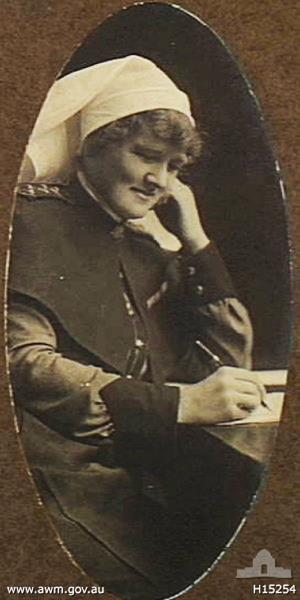JESSIE McHardy White’s name takes pride of place on the Dixons Creek Primary School Honour Board.
Born in 1870, her distinguished career as a military nurse during WWI, including at one stage as principal matron of the AIF in England, along with her contribution as a civilian nurse after the war, marks her as a great woman of the district.
The hospital ships carrying the carrying the wounded and dying from Gallipoli to Lemnos Island, and the field hospitals of Salonica where she was principal matron in charge of 364 nurses later in the war, could not have been further from her thoughts as a young girl attending the tiny school with her siblings and cousins.
She is recorded as being born at Yarra Flats and was the fifth surviving child of Scottish-born couple John Williamson and his wife Mary (McHardy).
After becoming a widow in 1896, Mrs White took up nursing and was running a private hospital in Melbourne before joining the Australian Army Nursing Service Reserve.
Sister White embarked with the first contingent of the Australian Imperial Force, arriving in Egypt on 4 December. Attached to a British military hospital, she also served in a hospital ship and was briefly matron of the 1st Australian General Hospital.
She served for a time in 1916 as principal matron of the AIF in England and was awarded the Royal Red Cross (1st Class) for her services.
In 1917 when it was decided to send Australian nurses to staff four British general hospitals at Salonica, Matron White resumed active service as principal matron in charge of a contingent of 364 nurses. She was also matron of No.1 Unit, a tent hospital with over 800 beds, located during summer at nearby Hortiach.
While ministering to sick and wounded soldiers, she and her staff contended with poor living conditions, extremes of temperature, threats to their safety from marauders, and with flies, lice, malaria, dysentery and typhus.
Perditta M. McCarthy, in the Australian Dictionary of Biography writes that she was an efficient and self-reliant woman who steadfastly preserved her contingent’s separate identity.
“Her severe treatment of one subordinate matron did not negate Matron White’s essential humanity,” she wrote.
McCarthy retells that moved by the burial of a British nurse, Matron White wrote … ‘I was glad to have been there and felt that we had left the little one – she was only 23 – in safe keeping’.”
Jessie White was appointed MBE, mentioned in dispatches, and awarded the Greek Medal for Military Merit and the Serbian Order of St Sava in recognition of her work at Salonica.
She died on 26 October 1957.








